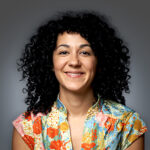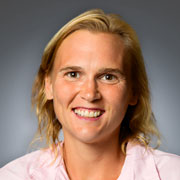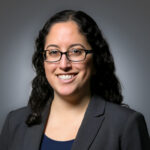This website uses cookies
We use cookies to ensure that we give you the best experience on our website. If you continue to use this site we will assume that you are happy with it.
Jump to:
Jaclyn Kelley-Widmer, Associate Clinical Professor of Law

Jaclyn Kelley-Widmer
First-year students in the spring 2022 1L Immigration Law & Advocacy Clinic focused on representing members of the broader Cornell community in applications for asylum, Deferred Action for Childhood Arrivals (DACA) and advance parole travel permission, and naturalization. As part of their caseloads, each team worked on an affirmative asylum case, conducting a detailed fact investigation including client interviewing and country conditions research. The 1L clinic worked in close collaboration with the Gender Justice Clinic and the Asylum and Convention Against Torture Appellate Clinic to represent clients on a set of related cases. A cross-clinic team of thirteen students organized to work both separately and together on coordinated fact-gathering, legal research, and writing for these complex and urgent cases.
Further, students worked on advocacy projects including presenting on current legal issues for DACA and undocumented students on campus and developing intercultural competency materials for several collaborating community organizations, including Open Doors English and the Black Alliance for Just Immigration.
Finally, the clinic celebrated several exciting wins, including an advance parole success for a DACA student and naturalization for several Cornell students.
Stephen Yale-Loehr, Professor of Immigration Practice
Hilary Fraser, Adjunct Professor of Law

Stephen Yale-Loehr

Hilary Fraser
The new Afghanistan Assistance Clinic started with a bang, with nine students each representing an Afghan student applying for asylum. The law students have been busy learning asylum law and country conditions in Afghanistan. They are also learning ethical duties in representing clients and how to deal with trauma in sensitive cases. The students plan to file their clients’ asylum applications by the end of April.
Rachel Goldberg, Associate Clinical Professor of Law

Rachel Goldberg
The Appellate Criminal Defense Clinic launched in the spring of 2022. In this clinic, students handle appeals for indigent defendants convicted of felonies in New York. Students identify reversible errors and unlawful procedures that may have contributed to their client’s conviction, investigate and pursue creative avenues for relief, and write compelling and persuasive briefs to the appellate court. Working closely with their clients to provide holistic representation, students not only help safeguard their clients’ appellate rights, but, where appropriate, also intervene to improve clients’ prison conditions. Later, students have the opportunity to draft reply briefs and orally argue their cases in front of a five-judge panel in the Appellate Division, First Department. The clinic partners with The Center for Appellate Litigation — a holistic public defense office in New York City — so students have the opportunity to discuss their cases with experienced appellate attorneys on a regular basis.
In its inaugural semester, students worked on two direct appeals. In one, the client is serving a seven-year sentence for an assault conviction. In the other, the client is serving a sixteen-years-to-life sentence for a robbery conviction. Students wrote appellate briefs that challenged these convictions from a variety of angles, such as arguing that the prosecution did not prove its case beyond a reasonable doubt, that the court failed to properly instruct the jury on a critical issue in the case, and that a search by police was unlawful. Despite weather and COVID-related challenges, students were able to visit their incarcerated clients and collaborate with them to provide high-quality, ethical appellate representation.
Estelle McKee, Clinical Professor of Law

Estelle McKee
This spring, the Asylum & Convention Against Torture Appellate Clinic succeeded in several appeals. Jordyn Manly and Emma Sprotbery, advanced clinic students, obtained a stipulated remand from the Second Circuit for their Salvadoran client, a lesbian who had been subjected to corrective rape. The government agreed that the Board of Immigration Appeals (“BIA”) needed to reconsider its asylum denial on all of the grounds the students argued in their brief, which they filed in fall 2021.
In another case, Sprotbery, Rachel Skene, and Johannes Maronga (class of 2021) obtained a remand from the BIA, which found their Cameroonian client prima facie eligible for asylum. Last spring, the students had filed a motion to reopen the client’s removal proceedings on the basis of a new affidavit from their client’s pastor and photos of his car, which soldiers had destroyed while searching for their client. The immigration judge had previously found their client not credible despite multiple photos and affidavits documenting soldiers searching for him, burning his house, detaining him, and beating him.
The BIA also decided an appeal briefed by Dana Kinel and Patricia Garcia-Linares (both class of 2020), and RJ Serrano (class of 2021). The immigration judge had denied their client asylum as a matter of discretion because he had stayed in several South American countries en route to the United States from Guinea. The BIA reversed the immigration judge, concluding that not only was the client eligible for asylum, he warranted it as a matter of discretion.
Also this semester, one team of students is drafting substantive and procedural due process arguments in a Second Circuit habeas appeal challenging a statute that mandates the detention of aggravated felons pending removal proceedings without a bond hearing. Their client has now spent almost the same length of time in immigration detention–effectively, a prison–as he did serving his criminal sentence (and, if not released by the end of the appeal, he will have spent significantly more time in immigration detention). A second team is representing a client in a Ninth Circuit appeal that raises complex crimmigration issues, as well as withholding and Convention Against Torture claims based on the egregious abuse the client suffered at the hands of his father, a Mexican cartel member. Rachel Skene, the clinic’s Pro Bono Scholar, is collaborating with the 1L Immigration Advocacy Clinic and the Gender Justice Clinic to draft letter briefs for affirmative asylum applications by a feminist activist and her family. Finally, the clinic filed an amicus brief in the Fifth Circuit addressing implicit bias and credibility.
Professor McKee, with Tsion Gurmu of the Black Alliance for Just Immigration, and Patricia Stottlemeyer of Oxfam America, co-authored an op-ed on racism in immigration law and policy in Bloomberg Law, titled “Black Immigrants to the U.S. Deserve Equal Treatment.” McKee and Stottlemeyer are also cowriting a policy brief on Representative Zoe Lofgren’s bill to convert the immigration-court system into Article I courts.
John Blume, Samuel F. Leibowitz Professor of Trial Techniques
Hannah Freedman, Adjunct Professor of Law

John Blume

Hannah Freedman
Students in the Capital Punishment and Juvenile Justice Clinics have been actively involved in the clinics’ new “Bring ‘Em Home” Project. This initiative is working to obtain the release on parole of former death row inmates and juveniles sentenced to life without parole who had their sentences vacated and are now serving paroleable life sentences. Students have been preparing parole packets, developing re-entry plans, and helping the clients prepare for their parole hearings. We are also happy to report that two recently released clients, Rusty Cain and Tony Enriquez, are both doing well “outside the walls.” Rusty works at a resort in Myrtle Beach, South Carolina; and Tony just matriculated at the University of South Carolina. Kudos to Rusty and Tony and the students who assisted them.
Professor Blume recently published an article, with professors Joe Margulies and Sheri Johnson, in the Columbia Journal of Human Rights: “Dead Right: A Capital Punishment Cautionary Tale,” which discussed numerous cases of persons who were executed that had raised constitutional arguments “too soon,” i.e., before the Supreme Court recognized the right. Blume, along with Professor Johnson, also recently participated in a symposium at Washington and Lee Law School (“Revoking Irrevocable Punishment”), and both he and Professor Freedman will participate and publish articles in the March 2022 Symposium sponsored by the Cornell Law Review commemorating the 50th anniversary of the Supreme Court’s decision in Furman v Georgia, which, for a brief window, found the American death penalty to be unconstitutional.
Ellen Eagen, Adjunct Professor of Law

Ellen Eagen
In its inaugural year, the Education Law Practicum served many clients including the Harlem Children’s Zone. Law students had the opportunity to discuss and critique the current K-12 education model with a variety of experts from the field including school board members, union members, school leaders, high school students, and the NYSED charter school authorizer. A key question revisited throughout the term was, “Does the traditional school structure serve 21st-century learning?”
Student lawyers researched a variety of issues, which now allow school clients to better serve students who come from historically underrepresented. These issues included whether schools can pay students to work while in school and the extent to which schools can help students in accessing healthcare. Student lawyers will end the term with a Know Your Rights presentation to high school students at an independent charter school in Syracuse, New York.
Celia Bigoness, Clinical Professor of Law

Celia Bigoness
Students in the Entrepreneurship Law Clinic helped more than 30 small businesses and entrepreneurs during the 2021–22 academic year. Student teams formed both for-profit and nonprofit businesses; advised business owners on issues including employment law, intellectual property protection, financing, and immigration concerns; and helped clients bring new products and services to market.
In March, the clinic’s long-time client, Lev Kitchen, opened its doors on the Ithaca Commons after nearly a year of planning and hard work. The clinic started working with Cornell alumni Ben Plotke and Jiayan Wu in the spring of 2021 on the purchase of the leasehold for the Lev Kitchen space. Read the full story.
Another clinic client coming to the market in spring 2022 is AI Learners. The company provides an educational software platform that seeks to make learning math accessible and engaging for students with disabilities through personalized computer games and analytics. The company’s founder, Adele Smolansky (Engineering ’23), started the company after learning to code in order to create math tools for her sister who was born with Rett Syndrome, a neurological disorder. And the VP of operations, Kylie Grinwald (ILR ’22), is a first-generation college student who was excited to join a team that is making education more accessible.
Clinic students Matt Tinker ’22, Zach Zaremba ’22, and Charlotte Lindsay ’23 have helped AI Learners navigate the complex web of federal, state, and international data security and privacy laws that protect minors on the internet. The clinic team has also advised on intellectual property protection, employment law, and a variety of other matters. In April 2022, the AI Learners team traveled to the Texas Christian University Values and Ventures Competition and won third place (out of 235 teams that originally applied to compete) and $15,000 to support business growth.
Briana Beltran, Lecturer
Beth Lyon, Clinical Professor of Law

Briana Beltran

Beth Lyon
At the close of 2021, the clinic received good news in multiple cases with young farmworker clients. One longtime client received his green card, more than four years after the clinic first began representing him in deportation proceedings and appeared in state court in Ontario County to obtain a guardianship order for him. On the other end of the spectrum, the clinic also obtained a guardianship order on behalf of another young farmworker in Erie County, hopefully setting him on the path to similarly obtain legal permanent residence one day in the future.
The clinic is also handling a number of cases filed over the past several years on behalf of parents and children who were separated at the border under the prior administration. In late 2021, the clinic assisted with the reunification of one such family, helping to facilitate a mother’s humanitarian parole application to migrate to the United States.
The clinic continued its new collaboration with National Chung Hsing University’s (NCHU) Department of Agronomy in central Taiwan, presenting a panel to undergraduate students at NCHU in November 2021, featuring researchers and practitioners on agricultural and migrant workers’ rights and experiences in Asia.
In December 2021, “Scorched Border Litigation,” an article cowritten by Beltran and Lyon along with Nan Schivone, legal director of Justice in Motion, was published in the Columbia Human Rights Law Review. The article analyzes the phenomenon of employers using temporary foreign workers’ absence from the United States as a litigation tactic. The article is notable for including a survey of practitioners regarding this trend as well as an analysis of COVID-era federal district court rules allowing for remote proceedings, arguing that such accommodations should be extended to benefit temporary foreign worker plaintiffs in the future.
In January 2022, the clinic and the Institute for Migrant Rights submitted a report to the U.N. Special Rapporteur on trafficking in persons, especially women and children, on the insufficiency of government inspection of palm oil farms and urging reform of Indonesia’s labor inspection regulations.
Beltran appeared on a panel entitled “Challenges in Transnational Litigation” during the 2021 National Farmworker Law Conference, which discussed the “Scorched Border Litigation” article and related issues that arise in litigating cases with temporary foreign worker clients. In January 2022, Lyon testified before the New York State Department of Labor’s Farm Laborers Wage Board in support of lowering the state’s farmworker overtime threshold from sixty to forty hours.
Jared Carter, Visiting Professor of Law (not pictured)
Mark Jackson, Adjunct Professor of Law
Ava Lubell, Local Journalism Attorney (not pictured)
Heather Murray, Managing Attorney of the Local Journalism Project
Christina Neitzey, Stanton Fellow (not pictured)

Mark Jackson

Heather Murray
The clinic has had an active litigation docket over the past few months, with three students and a faculty member conducting oral arguments on access-related matters. Clinic students Andrew Gelfand, Steven Marzagalli, and Ashley Stamegna argued in Vermont, Pennsylvania, and New York state courts, respectively; and Associate Director Jared Carter argued at the Second Circuit. The clinic expects an alumna, Lindsey Ruff ’19, to argue in the Fourth Circuit in the coming months. The clinic has also continued to expand its transactional assistance to journalists, including through a successful partnership with Cornell’s Entrepreneurship Law Clinic that was launched last fall.
The clinic honored Ruff in January for her role in representing Justice 360 in litigation against the state of South Carolina by naming her the inaugural recipient of the clinic’s Jackson Distinguished Alumni Award. Along with Cornell’s Capital Punishment Clinic and Boies Schiller Flexner LLP, the clinic represents Justice 360 in seeking access to the state’s lethal injection cocktail and protocols. Ruff conceived of a novel theory of professional speech while still a law student and since then has been co-counseling with the clinic in the District of South Carolina and the Fourth Circuit.
Stamegna argued in December in a case before the New York Fourth Department in support of news outlet The Batavian’s appeal of the denial of its right of access to a family court hearing transcript. The lower court ruled that the clinic’s client was not entitled access to the actual court proceeding nor the transcript. Stamegna argued compellingly that the public interest in the disqualification hearing outweighed any privacy interest in the underlying proceedings.
Gelfand argued an access matter in the Vermont Superior Court in February on behalf of the clinic’s long-standing client VTDigger. He argued a motion to compel the State of Vermont to provide our client with information detailing precisely what documents it was withholding from production and on what basis. The documents relate to our client’s coverage of a scandal involving the state’s handling of the federal EB-5 immigrant investor program. The lower court issued a decision rejecting our argument, and the clinic is considering an appeal.
Carter argued in the Second Circuit in March on behalf of journalist Charles Seife in an appeal involving access to a series of U.S. Food and Drug clinical trial reports regarding a controversial drug used to treat muscular dystrophy. Defendants in the matter have wrongly asserted that the requested documents fall within FOIA Exemption 4 (which allows the FDA to withhold certain commercial or financial information) and therefore need not be disclosed under FOIA.
Marzagalli conducted an evidentiary hearing and argued for attorney’s fees in March in the Commonwealth Court of Pennsylvania in a case on behalf of journalist Dan Schwartz. The court dismissed the State’s motion to dismiss for mootness from the bench and ordered a supplemental briefing to be conducted.
The clinic and co-counsel Davis Wright Tremaine represent Rutgers University Professor Audrey Truschke in an important case implicating academic freedom and free speech principles. The clinic represents Truschke in a defamation and conspiracy suit the Hindu American Foundation filed in federal court in the District of Columbia. In late 2021, the clinic filed a motion to dismiss, arguing that HAF is abusing the legal system to silence its critics and political rivals, that HAF fails to state a claim, and that Truschke is not subject to personal jurisdiction in the District of Columbia. A decision on the motion is pending. Clinic students Kathryn Rider and Tim Birchfield, as well as summer fellow Taylor Kay, assisted in briefing.
The clinic will continue its partnership that was launched last semester with the Entrepreneurship Law Clinic to provide transactional legal advice to a number of local journalist clients, including Conecta Arizona and Kansas City Defender.
The clinic filed an amicus brief in the U.S. Supreme Court in December, arguing on behalf of media organizations that a Puerto Rico Supreme Court ruling undermines the press’s vital role in informing the public about the development of domestic violence law. Four days after the clinic filed its amicus, the state Solicitor General issued a statement agreeing that the recordings should be made public. Three days later, the Puerto Rico Supreme Court announced a new court watch program to permit volunteers to observe some proceedings. While the Supreme Court later denied the Petition, the amicus made a tangible difference in ensuring the continued openness of these proceedings. Birchfield and Stamegna assisted in briefing.
The clinic represents Jim Meaney, publisher of the watchdog blog Geneva Believer, in a defamation suit before the New York Fourth Department. In early 2020, Massa Construction sued Meaney in state court for defamation over Meaney’s reporting on apparent ties between Massa and the Geneva city council. In May 2021, the trial court granted Meaney’s motion for summary judgment and, applying New York’s recently-amended anti-SLAPP law, awarded attorneys’ fees to the clinic and co-counsel Greenberg Traurig, LLP. Massa appealed the summary judgment decision and fee award. Clinic students Corby Burger, Michael Mapp, and Rob Ward assisted on this matter at the trial court level, with Ward arguing the summary judgment motion. Kasper Dworzanczyk and James Pezzullo are preparing an appellate briefing to be filed later this spring.
Associate Director Jared Carter has been working closely with the Oklahoma ACLU on an amicus brief to support the NAACP’s facial challenge to Oklahoma’s anti-protesting statute. The clinic expects to file the amicus this spring in an effort to invalidate this troubling development.
Finally, the clinic filed suit in March on behalf of Buffalo-based news outlet Investigative Post — a Buffalo-based nonprofit investigative reporting outlet — against Erie County seeking access to an engineering report that assessed the condition of Highmark Stadium. Information the outlet seeks is critical to the public understanding of how much Erie County and New York State taxpayers will have to shoulder to either replace or repair the current home of the Buffalo Bills.
Carl Williams, Assistant Clinical Professor of Law

Carl Williams
In the past semester, the students in the Movement Lawyering Clinic have provided litigation support, research, writing, and more to many movements across the U.S. Students drafted memos that directly led to the dismissal of four criminal cases in Boston. The movement defendants were arrested and charged after attending a protest in the spring of 2020. Clinic participants are also working on researching and writing to support Indigenous environmental organizers. Still further, students have worked to draft compassionate release petitions for incarcerated women at heightened COVID risk.
William Niebel, Adjunct Professor of Law

William Niebel
The Tenants Advocacy Practicum continues to expand, as it works to bridge the housing justice gap in Ithaca and beyond. This spring, the practicum added another advanced course (Tenants Advocacy Practicum IV) and five of the law students from the fall returned to continue sharpening their advocacy skills and serving local community tenants in need. Four of these advanced students have been able to provide full representation to tenants in Ithaca City Court. Additionally, thirteen law students and two undergraduates are enrolled in the primary course this fall, bringing the total to twenty students currently enrolled — a new peak.
On April 14, student attorneys Jennifer Seidman and Veronica Blascoe won a judgment of $3,065 on behalf of their client, Peter Kaplinsky, against his former landlord, Ithaca Student Housing, LLC. The judgment included treble damages for Kaplinsky’s $995 withheld security deposit as well as the filing and service costs.
This case presented a novel issue of service on the absentee landlord. The tenant had previously tried to file the case pro se but was unable to obtain jurisdiction over the landlord because the notices mailed by the court were returned undeliverable. The student attorneys were able to use LLC law to serve the LLC by service on the Secretary of State in Albany.
On January 28, the practicum was recognized at a virtual White House event as one of the law school programs that responded to the U.S. Attorney General’s “Call to Action” of August 30, 2021, to address the nationwide housing and eviction crisis. The practicum’s five advanced students were honored to attend, along with Professor Niebel and Michaela Rossettie Azemi, director of pro bono services and externships.
The practicum continues to make an impact in landlord-tenant disputes in Ithaca City Court, including one case that went to trial in December. The student attorney who handled the case, Jong Wook Bae, said: “It initially looked like a small and simple security deposit case, but it went to trial because the landlord did not take it well, as if it were a challenge to his business practices. [We] had to think fast that morning, because the landlord showed up . . . armed with two witnesses and eight exhibits. But we were well prepared, so we won.”
Since the expiration of the New York eviction moratorium in January, the work—and the experience gained by the students—has continued to accelerate. In February, the Tenants Legal Hotline (where the Practicum gets its cases) hit a milestone of 500 cases, providing legal advice and representation for local tenants, of which 35% were Cornell students.
The hotline and practicum also recently received two new grants with additional funding to boost the engagement of law students, undergraduates, and community partners. Cornell Law School received a Public Issue Network Grant from the David M. Einhorn Center for Community Engagement titled “Housing Justice for All – Developing a Network of Legal Access Across Tompkins County and Beyond.” The grant supports the expansion of outreach to courts across the Sixth Judicial District as well as deepening relations with community stakeholders. Additionally, Cornell Law School received funding from the New York State Office of Temporary and Disability Assistance, through a subcontract with Legal Assistance of Western New York. This funding will allow the practicum to continue to fund another Tenants Advocacy Fellow and add a staff attorney position to build greater capacity to serve tenants in need of legal assistance across a wider geographic region.
Professor Niebel’s article, “The Process Due When Rent is Due: Residential Nonpayment Evictions in New York after COVID-19,” was published in the New York Real Property Law Journal, Vol. 49, No. 2 (Fall 2021). It has already proved to be an invaluable reference for judges and practitioners, as well as the students in the practicum.